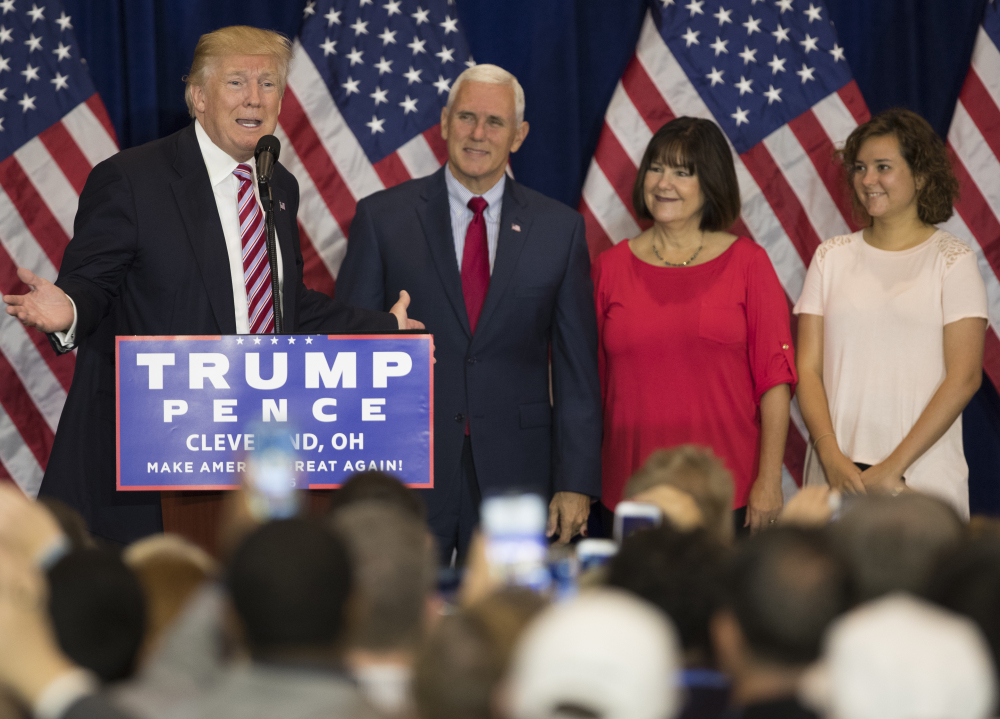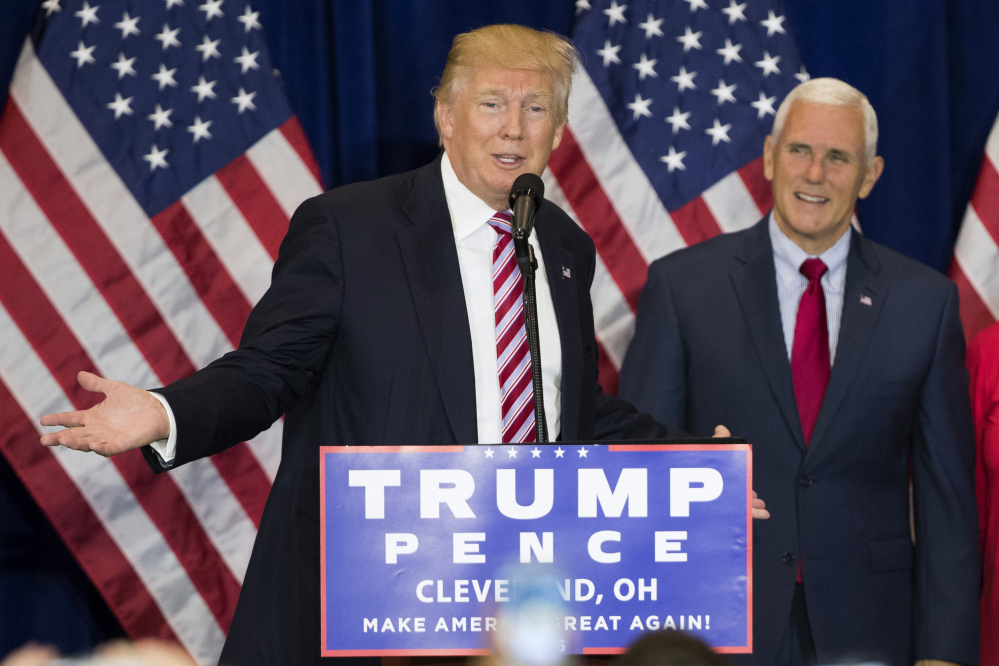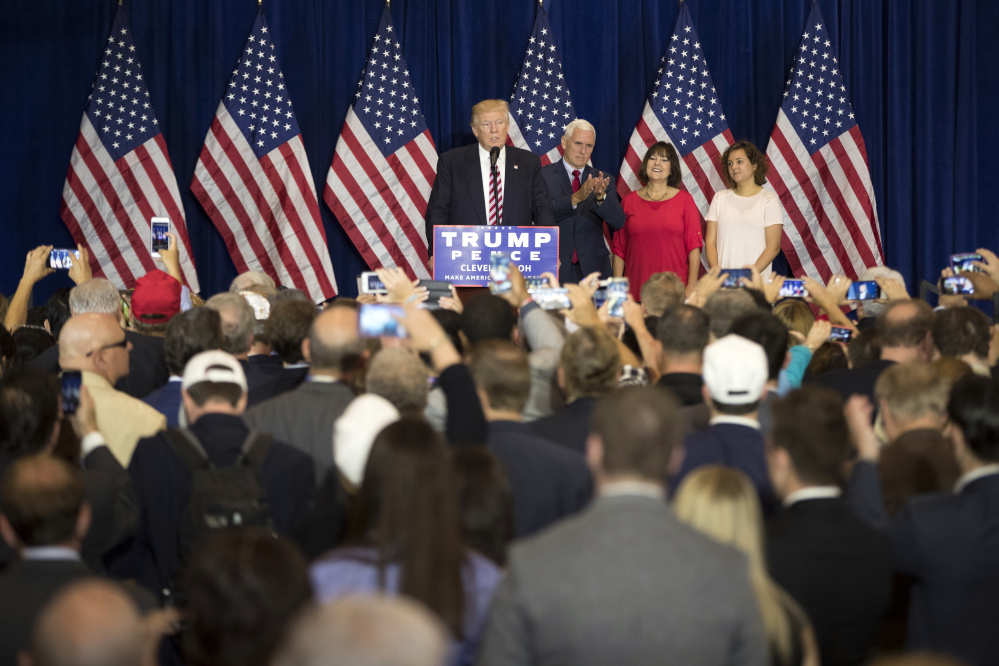CLEVELAND — A traumatized Republican Party came here hoping for an arena-size group therapy session.
The Republican Party at large would talk through its differences, remind itself of what it shares, then head into the fall election with a renewed sense of identity.
Instead, the week laid bare the fact that the party has become a collection of warring tribes with no coherent set of principles beyond a burning desire to keep Hillary Clinton out of the White House.
The question many have is whether Donald Trump – with his skepticism of free trade and internationalism, blurry record on social issues, and insensitivity toward the life experiences of minorities – now owns the Republican Party or whether he is just borrowing it until November.
“I think the party is either in a major transition or in the throes of self-destruction,” said Randy Corporon, a Colorado delegate and tea party leader attending his first party convention.
Wednesday night’s eruption on the convention floor, when Sen. Ted Cruz, R-Texas, took the stage and refused to endorse the celebrity billionaire who had bested him in the primary race, was the most dramatic expression of the party’s existential crisis.
On what was supposed to be a victory lap the day after his acceptance speech, Trump was still fixated on the snub by Cruz.
“I don’t want his endorsement,” Trump said during a rambling, disjointed news conference Friday morning. “If he gives it, I won’t accept it.”
Rather than turning his attention to the battle ahead, Trump revisited some of the low points of his primary fight: He defended his retweet of an unflattering picture of Cruz’s wife to his millions of Twitter followers. And he called attention to a false and far-fetched tabloid claim that Cruz’s father might have had a hand in John F. Kennedy’s assassination.
Trump also insisted that the quadrennial Republican gathering had been “probably one of the most peaceful, one of the most beautiful, one of the most love-filled conventions in the history of conventions.”
DISSONANT MOMENTS
Whatever its artistic merits, the convention had more than its share of dissonant moments.
Milwaukee County Sheriff David Clarke told the gathering Monday night that the Black Lives Matter movement represents “anarchy” and “a collapse of the social order.”
On Wednesday, however, Lynne Patton, who runs Eric Trump’s foundation and is African American, stood on the same stage and declared: “There’s not one person in this room who can deny that, historically, black lives have mattered less. My life mattered less. And whether we like it or not, there are people out there who still believe this to be true.”
On Thursday, billionaire PayPal co-founder Peter Thiel became the first person to proclaim his homosexuality to a Republican convention audience, saying: “I am proud to be gay. I am proud to be a Republican.” During his nomination acceptance speech minutes later, Trump declared that he would protect “LGBTQ citizens,” prompting widespread applause in the hall.
Yet speaking earlier that same night was Tony Perkins, head of the Family Research Council, which argues that the rationale for same-sex marriage could also be used to justify man-horse matrimony. The Republican platform approved this week maintains opposition to same-sex marriage and argues in favor of allowing discrimination against gays for religious reasons.
The rifts extend into foreign policy, as well. In an interview with the New York Times, Trump said he would condition assistance to NATO allies on whether the United States was “properly reimbursed” for the cost of its military operations – an abandonment of NATO’s core tenet as a mutual-defense organization.
“I think he’s wrong on that,” Senate Majority Leader Mitch McConnell, R-Kentucky, told Politico. “I don’t think that view would be prevalent or held by anybody he might make secretary of state or secretary of defense.”
And while the convention approved the party’s most socially conservative platform ever, Trump has played down cultural issues in his campaign and did not mention abortion or God in his acceptance speech.
GRATITUDE FOR SUPPORTERS
The Republican nominee did express gratitude to his evangelical supporters. “It is an easy decision to support Donald Trump over Hillary Clinton,” said David Lane, who heads the American Renewal Project, which mobilizes conservative pastors and hosts rallies in battleground states.
But he added: “Trump needs to give Christian voters a clear reason to vote. Otherwise, they will stay home.”
The convention also saw a few stray issues cross the stage. Trump’s daughter Ivanka, who gave the introduction to his acceptance speech Thursday night, promised that her father would rewrite federal labor laws to ensure equal pay for women and would “focus on making quality child care affordable and accessible for all” – two proposals espoused by Democrats.
Trump’s rout of a highly credentialed field of 16 candidates in the Republican primary contest revealed a chasm between the party’s passionate grass roots and the elites who have run its presidential selection process for decades. Much of that energy comes from insurgent forces such as the tea party movement, which was instrumental in giving Republicans their biggest House majority since 1929.
Trump proved that it is possible to win a strong plurality of the vote with an appeal to nativism and bigotry, if it is dressed up as a backlash against “political correctness.” Moreover, it is now clear to party leaders that the clinical, by-the-book conservatism espoused by the Republican establishment has been insufficiently responsive to the economic concerns of working-class Americans.
Send questions/comments to the editors.




